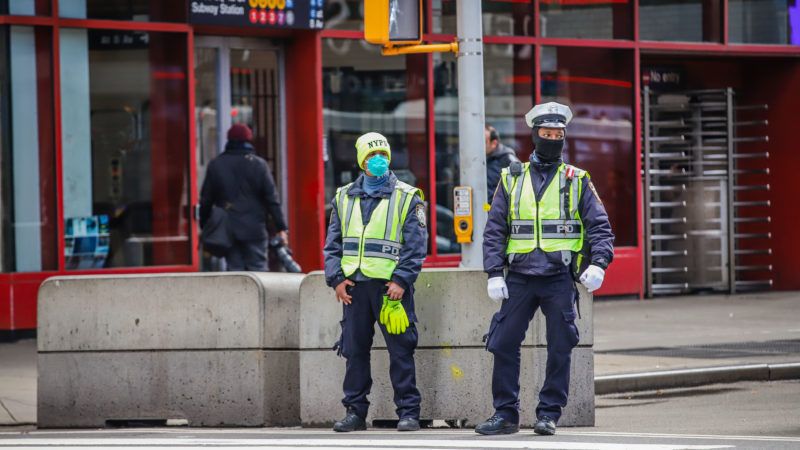Police Powers During a Pandemic: Constitutional, but Not Unlimited
Weighing the state and local response to COVID-19

State and local governments are currently taking dramatic and sometimes unprecedented action in response to the COVID-19 pandemic, including "shelter in place" orders, bans on public gatherings, and business shutdowns. What's the legal basis for such sweeping actions?
In the U.S. constitutional system, each state possesses a traditional authority to regulate in the name of public health, safety, and welfare. Known as the police powers, this authority has deep roots in Anglo-American law. In his landmark Commentaries on the Laws of England (1765), the British legal theorist William Blackstone defined the police powers as "the due regulation and domestic order of the kingdom, whereby the inhabitants of a State, like members of a well-governed family, are bound to conform their general behavior to the rules of propriety, good neighborhood, and good manners, and to be decent, industrious, and inoffensive in their respective stations."
Citing Blackstone, the American legal theorist Thomas Cooley, in his influential Treatise on the Constitutional Limitations Which Rest upon the Legislative Power of the States of the American Union (1871), said the police powers of a state "embraces its system of internal regulation, by which it is sought not only to preserve the public order and to prevent offenses against the State, but also to establish for the intercourse of citizen with citizen those rules of good manners and good neighborhood which are calculated to prevent a conflict of rights, and to insure to each the uninterrupted enjoyment of his own, so far as is reasonably consistent with a like enjoyment of rights by others."
As one example of the police powers put to appropriate use, Cooley pointed to "quarantine regulations" and related measures designed to protect the public from persons or property "infected with disease or otherwise dangerous."
The U.S. Supreme Court has long agreed that the states have police powers of this sort. In Gibbons v. Ogden (1824), Chief Justice John Marshall observed that the police powers, that "immense mass of legislation," as he put it, "which embraces every thing within the territory of a State, not surrendered to the federal government," includes "quarantine laws" and "health laws of every description."
But the police powers are not a blank check—the state may not do absolutely anything it wants simply by invoking public health or safety.
Here's a framework for weighing the constitutionality of purported health or safety laws, regulations, and orders. The goal of this framework is to prevent or curtail the illegitimate use of a state's otherwise lawful police powers.
The first question to ask is whether the law, regulation, or order serves a genuine public health or safety purpose. Plenty of regulations would pass muster. But some would not. For instance, is public health or safety advanced in any way when a state requires a would-be interior designer to spend time and money obtaining a state-issued occupational license? Of course not. By contrast, is the public made safer when a confirmed COVID-19 patient is quarantined until a doctor gives that person the all-clear to return to normal life? The answer to that would seem to be a clear yes.
The next question to ask is whether the law, regulation, or order is the least restrictive means available for the state to pursue its legitimate public health or safety objective. Once again, quarantining a confirmed COVID-19 patient (until non-contagious) would seem to fit the bill. Other severe measures that similarly burden civil liberties might not. The details matter.
Another key question to ask (when appropriate) is whether a "temporary" measure has exceeded its shelf life. An emergency measure that was perfectly justifiable yesterday may become constitutionally suspect tomorrow. Things change and it is paramount to return to a normal footing as soon as the crisis has lessened or passed.
To be sure, there will be hard cases and this framework does not provide all the answers. We are likely to be arguing about the wisdom and legality of many government responses to COVID-19 for many years to come. Still, it does not hurt to remember that a state's police powers are not unlimited, even amid a pandemic.


Show Comments (64)